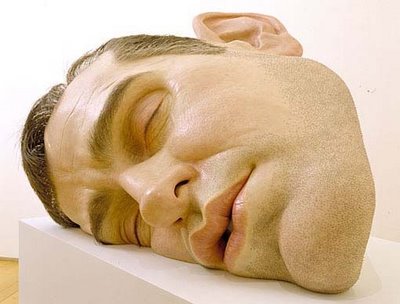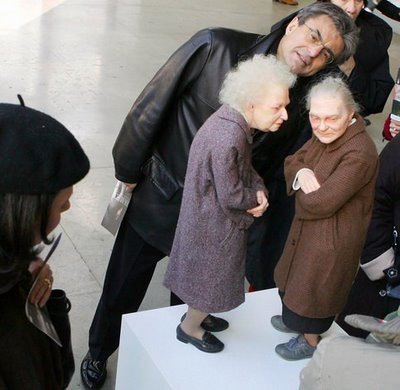













Ron Mueck (born 1958) is an Australian hyper-realist sculptor working in Great Britain. Born in Melbourne, Australia, to parents who were toy makers, he labored on children’s television shows for 15 years before working in special effects for such films as "Labyrinth", a 1986 fantasy epic starring David Bowie.
Mueck moved on to establish his own company in London, making photo-realistic props and animatronics for the advertising industry. Although highly detailed, these props were usually designed to be photographed from one specific angle hiding the mess of construction seen from the other side. Mueck increasingly wanted to produce realistic sculptures which looked perfect from all angles.
Eventually Mueck concluded that photography pretty much destroys the physical presence of the original object, and so he turned to fine art and sculpture. In the early 1990s, still in his advertising days, Mueck was commissioned to make something highly realistic, and was wondering what material would do the trick. Latex was the usual, but he wanted something harder, more precise. Luckily, he saw a little architectural decor on the wall of a boutique and inquired as to the nice, pink stuff’s nature. Fiberglass resin was the answer, and Mueck has made it his bronze and marble ever since.
Eager to make more personal sculptures, his extraordinary Dead Dad, a small-scale hyper-real sculpture of his dead and naked father was the surprise show stopper at the London Royal Academy’s controversial show Sensation (1997) which featured works from the collection of Charles Saatchi.
Mueck’s huge 4.5m crouching Boy was the centrepiece of the Millennium Dome in London and of the Venice Biennale in 2001. The artist’s work is becoming ever more intriguing, ranging from smaller-than-life size naked figures to much larger, but never actual, life size. Consequently his hyper-realistic sculptures in fibreglass and silicone, while extraordinarily lifelike, challenge us by their odd scale. The psychological confrontation for the viewer is to recognise and assimilate two contradictory realities.
Pregnant woman is Mueck’s most ambitious work to date. The sculpture is monumental (2.5m high), utterly imposing and even intimidating when first experienced by the viewer. After a while, however, this majestic Earth Mother becomes familiar, unthreatening and endearing. She is exhausted, hands held back over her head; the face is tender and vulnerable. Her presence is a powerful one indeed, and she evokes a multitude of thoughts, ranging from the wonder of maternity and procreation to population control and the burden of female responsibility. In 2002 his sculpture Pregnant Woman [1] was purchased by the National Gallery of Australia for AU$800,000.










No comments:
Post a Comment